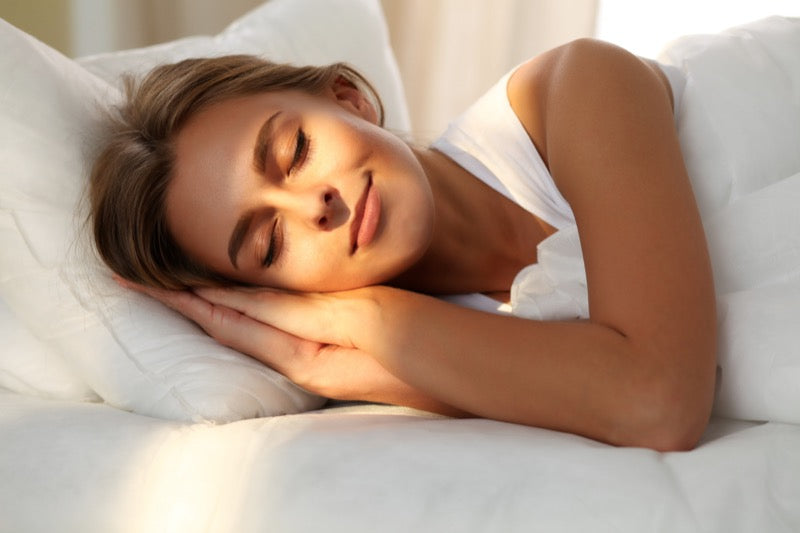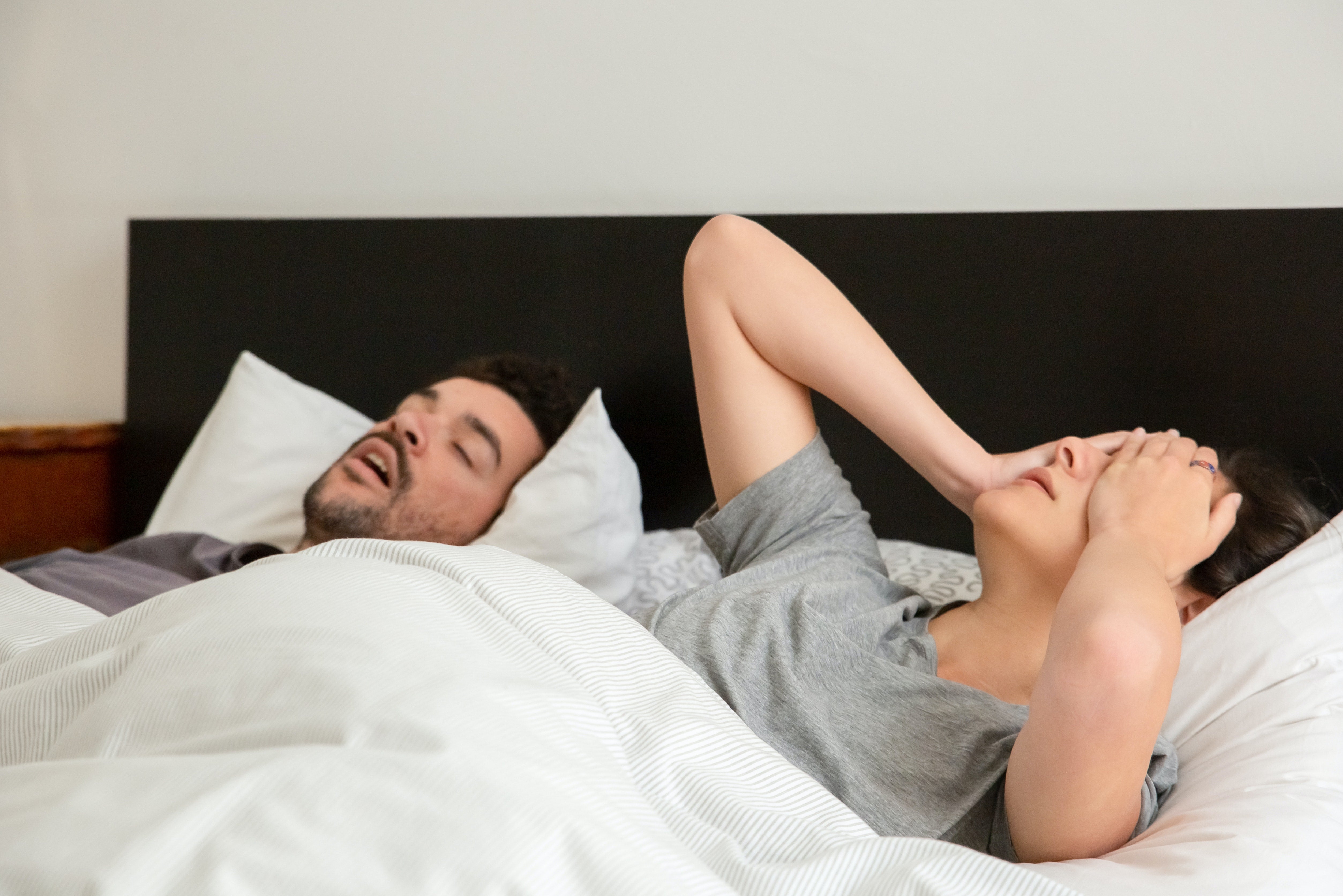Is Sleep Deprivation Making You Miserable? Consider "Sleep Divorce."

Causes of Poor Sleep When Sharing a Bed
Body Heat
All kinds of issues can affect your sleep if you’re sharing a bed with someone. You might be too hot or too cold at night and your temperature (or temperature preference) may differ significantly from your partner's. Body heat is one of the main complaints people cite when talking about sleep problems with a partner.
Tossing and Turning
Is your partner tossing and turning all night long or are you the one constantly moving? Is it because of restless leg syndrome, not enough room in bed or something else? Night movements can interrupt your normal sleep cycle or the sleep cycle of your partner. They can prevent you or your partner from getting that much needed deep sleep.

Snoring and Sleep Apnea
Do you have a snoring partner? You're not alone. Snoring is incredibly common - 57% of men and 40% of women in the United States snore. If you or your partner is snoring loudly and it is disruptive during the night, your should check with your doctor about the possibility of obstructive sleep apnea. Consider seeing a sleep expert and getting a sleep study. Sleep apnea can be a dangerous and even life-threatening condition. It should be diagnosed and treated appropriately to prevent detrimental effects to your health and wellbeing.
Frequent Urination
Are you up once or several times in the middle of the night to urinate? That can be disruptive to your sleep, as well as to the sleep of your bed partner. Here are a few ways to try to mitigate this problem:
- Hydrate early in the day.
- Restrict fluids three to four hours before bed.
- Avoid eating two to three hours before bedtime.
This one may sound weird, but also consider taping your mouth closed at night. James Nestor, author of Breath: The New Science of a Lost Art, and many breathing experts around the world recommend mouth taping. One of the signs that a sleep specialist looks for to indicate obstructive sleep apnea or other sleep disorder is if you have to visit the bathroom multiple times at night.
There's a chemical produced by your hypothalamus called vasopressin - it instructs your kidneys to retain water while you are asleep. If you're not sleeping deeply, vasopressin is not produced, your kidneys excrete urine, your bladder fills up and you get the urge to urinate. Mouth taping may help by forcing you to nose breathe, which improves deep sleep. Nose breathing has other benefits, including improved oxygen absorption.
Different Sleep Schedules
If your partner is a night owl and you are an early bird, it may be impossible for either of you to get the sleep you need. If one of you is up reading or watching TV, while the other is trying to sleep, resentment and frustration may build. The best solution may be sleeping apart, either in a separate bed or a separate room.
So, what is sleep divorce?
A “sleep divorce” may be the answer. Sleep divorce is choosing to sleep in separate beds in the same room or even separate rooms to get better sleep and wake up more rested and refreshed. Hundreds of thousands of people have chosen to do it, in order to protect their relationships and their health.
Just how common is sleep divorce?
Slumber Cloud conducted a survey of 2,000 adults and found that 12% of American couples sleep in separate rooms or beds, and that another 30% of couples are discussing it. One in five people reported that their partner is the most significant factor interrupting their sleep on a nightly basis.
Sleep Divorce Can Actually Improve Your Relationship
If you wake up with your partner’s hair in your face or you are feeling overheated and a little claustrophobic, you may need more space. If you are just struggling to get adequate sleep and rest each night, a sleep divorce may not only improve your sleep, but also help to improve and protect your relationship and your mental health.
Wanting to sleep alone, have the bed to yourself and avoid battles over the covers are all reasonable desires. Being able to toss and turn without worrying about disturbing someone else can be a huge relief. You can still show love to your partner without sacrificing good sleep: make time to snuggle, have date night, enjoy each other’s touch and presence, but eventually say good night and retire to your own bed or bedroom to sleep.
One 2016 study found that sleep problems and relationship problems tend to occur simultaneously and can be “bidirectional, reciprocal and dynamic”. Improving your sleep and the sleep of your partner can be an excellent way to improve your relationship. Set yourself up for success in your relationship by making sure you are both getting adequate sleep each night.
A 2013 study at Berkely found that conflicts between romantic partners are much more likely after a bad night’s sleep. When we are sleep deprived, we are more irritable and grumpy. It is hard to resist an argument when we are running on empty. If you are fighting more with your significant other, it may be time to focus on your sleep.
Sleep Divorce Can Improve Your Sex Life
The author of Sleeping Apart not Falling Apart, Jennifer Adams, suggests that sleeping apart can actually improve your sex life. If you are not irritated and grumpy with your partner, you may be more likely to enjoy them, want to spend time with them and have sex with them. Adams and her husband of 15 years sleep in separate bedrooms. “Hundreds of thousands of couples are heading to separate rooms each night and enjoying a full life, and great relationships because they are getting a good night’s sleep each night.”
Dr. Jamea encourages us to “ramp up physical affection throughout the day”. Take a shower together, hang out on the same couch as you watch a movie, snuggle and talk before bed. The focus is to create physical intimacy to stay connected to your partner.

Health Benefits of Better Sleep After Sleep Divorce
Poor sleep not only affects your relationships, it can impact your quality of life and your health. Sleep deprivation is a real problem that many people are experiencing. When you get adequate sleep, your mood is improved, your blood pressure is lower, your body is well-rested and you simply feel better. Struggling to sleep because of your partner can cause you to harbor resentment against him or her.
The Centers for Disease Control and Prevention estimates that more than a third of American adults consistently sleep less than seven hours per day. Chronic sleep deprivation can lead to cardiovascular disease, heart attack, stroke, diabetes, weight gain, obesity, high blood pressure, dementia, seizures and pain.
Focusing on self-care and getting enough rest is essential and can be aided by sleeping in your own bed and eliminating sleep disruptions by your partner. The National Sleep Foundation states that “healthy sleep is important for healing and repairing the heart and blood vessels, reducing risk for obesity, promoting healthy cognitive functioning and promoting a healthy immune response”.
Sleep Compromises and Additional Options
Part-time Sleep Divorce
If the idea of a sleep divorce sounds too radical, consider some compromises. If either you or your partner are unhappy with the idea of a sleep divorce, talk with each other about options. Consider sleeping apart on weeknights and together on weekends.
Intimate Time
Cuddle before bed. Snuggle in the morning. Create a nighttime ritual together like watching TV in bed an hour before you go to sleep. These intimate times give you the physical intimacy that your body craves and allow you to get the quality sleep that you desperately need in your own quiet bed in your own peaceful bedroom.
What To Do If Your Living Space Is Too Small?
If you like the idea of a sleep divorce but your living space is too small to sleep in separate rooms, there are a few items that can help.
White Noise Machine, Ear Plugs or Soli Pillow
Add a white noise machine to your bedroom. The steady white noise masks jarring, unpleasant noises and can help you fall and stay asleep.
Ear plugs are an option, although they can only partially block unwanted noises and can be uncomfortable or even impossible to wear on your side. If you can tolerate earplugs in your ears, consider the EarBliss pillow by Soli - it has unique ear holes, which make it possible to sleep comfortably with earplugs or earbuds on your side.
Finally, consider the Soli pillow with speakers. It's a unique product that wraps around your head and allows you to sleep comfortably all night long in your personal sound oasis. Its soft silicone headphones gently seal your ears. It blocks and masks unpleasant external sounds and replaces them with anything you'd rather listen to, streamed straight from your phone, be it relaxing music, white noise, or nature sounds.
Extra Blanket
If your partner is always stealing the comforter, add an extra blanket on your side of the bed so you can each be covered all night. If you have not tried a weighted blanket yet, give one a try. The weight helps you feel relaxed and grounded allowing you to fall asleep faster and sleep more deeply through the night.
Eye Mask or Head Warm Compress
If your partner is scrolling through her phone late into the night and you are ready for bed, wear an eye mask to block out the blue light and improve your sleep. If you want to take relaxation to the next level, try a Huggaroo Eye Mask with aromatherapy (lavender, chamomile, lemongrass and peppermint) or a Huggaroo Heated Headache Wrap that soothes and comforts you as you fall asleep.



